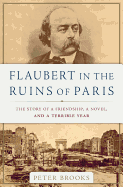
Gustave Flaubert's evolving connection with political ideals and disillusionment drives Peter Brooks's fascinating work of literary history, Flaubert in the Ruins of Paris: The Story of a Friendship, a Novel, and a Terrible Year.
Literary critic Brooks (Reading for the Plot) focuses his discerning mind on Flaubert's underappreciated novel, Sentimental Education. He convincingly connects the book Flaubert considered his masterpiece to the violent and tumultuous political history of 19th-century France. Flaubert in the Ruins of Paris explores Flaubert's own assertion that serious reading of Sentimental Education would have prevented the devastation wrought in Paris in 1871, following the Franco-Prussian War, when the French Third Republic bloodily suppressed the Paris Commune.
Sentimental Education, Brooks skillfully argues, was written about the ill-fated revolution in 1848 that led to the French Second Republic, a failed revolution in which Flaubert foresaw the irrationality and violent sectarianism that would later tear his country apart. To make his case, Brooks includes Flaubert's correspondence with friend George Sand as well as passages from the novel, all of which display Flaubert's singular talent for description, characterization and mood. Moreover, Brooks's careful, sophisticated and nuanced scholarship pieces together a larger impression of troubled modernity, and reveals Flaubert's self-consciousness as an author in the face of cataclysmic historical events. Flaubert in the Ruins of Paris is a profound look at the personality and beliefs of a literary giant, a work as entertaining as it is probing. --Scott Neuffer, freelance journalist, poet and fiction author

